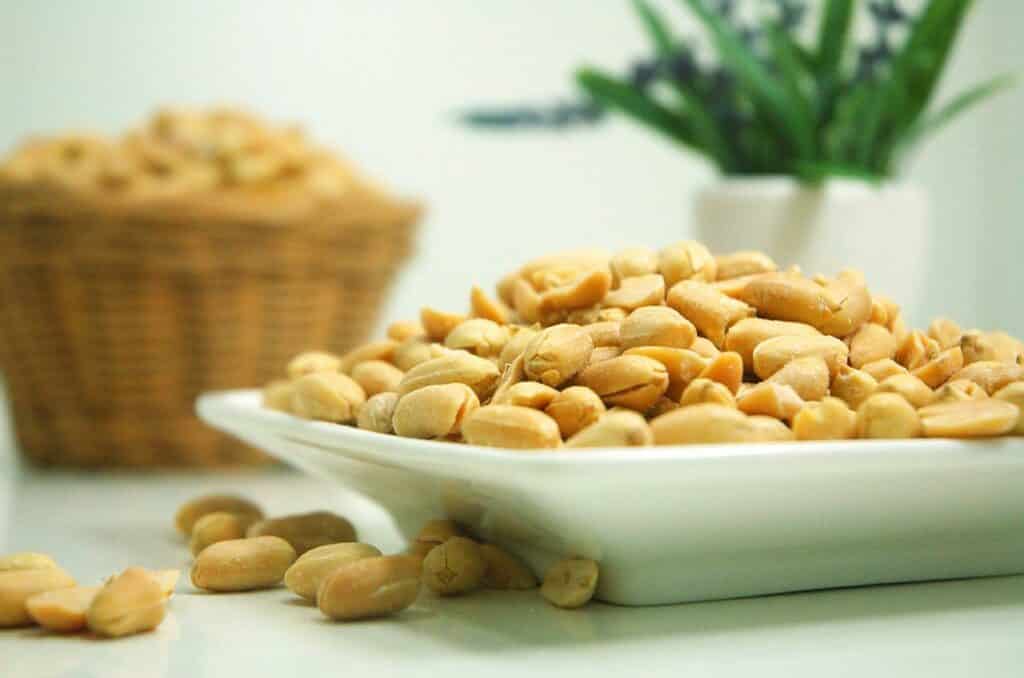When it comes to peanuts, they’re easily one of the best treats around.
Eating peanuts daily gives you vitamins, protein, and minerals that are nourishing and great for your health.
While peanuts offer plenty of health benefits for humans, you might wonder if it’s safe to feed your dog unsalted peanuts.
So, can dogs eat unsalted peanuts?
Yes.
Dogs can eat unsalted peanuts in moderation as they are unlikely to cause them harm.
However, unsalted peanuts should only be offered as occasional treats, not as a mainstay diet to avoid obesity-related diseases like diabetes, as they’re high in fats.
This article will explain everything about unsalted peanuts and dogs.
It will also discuss how to feed your dog unsalted peanuts safely.

Can dogs eat unsalted peanuts in the shell?
While unsalted peanuts are not considered toxic to dogs, you should not give them peanuts with the shell.
Peanut shells have a rough texture that can cause severe damage to your dog’s digestive tract if ingested.
This may cause abrasion and result in an infection.
Peanuts in the shell are also rich in fiber which may disrupt your pup’s digestive function as their systems are too sensitive.
If your dog swallows peanuts in the shell, they can lodge in their trachea, causing choking.
Some peanuts in the shell may also be contaminated with pesticides causing severe health issues in your dog, including abnormal heart rates, collapse, and tremors.

How many unsalted peanuts can a dog eat?
Generally, larger dogs should have 4-5 peanuts a few times a week if he’s not allergic to them.
Ensure you remove the shells before offering peanuts to your dog and monitor him closely for any negative reaction.
However, avoid giving puppies unsalted peanuts as they are high in fats and can lead to obesity and pancreatitis in dogs.
Puppies have a more sensitive digestive system, and feeding them foods high in fats can upset their stomach.
Unsalted peanuts can also pose a choking hazard to your puppy, so it’s best to avoid them altogether.
What types of dogs should avoid unsalted peanuts?
If your dog has a pre-existing condition or certain restrictions, peanuts can worsen their condition further.
These may include:
Dogs with pancreatitis
Peanuts can be problematic for dogs prone to pancreatitis or already having the condition.
Peanuts have a high-fat content than can cause digestive upset and even pancreatitis, especially when consumed in large amounts.
Dogs with peanut allergies
Depending on exposure, some dogs may have peanut allergies and can experience symptoms ranging from mild to severe.
If your dog ingests unsalted peanuts, he may experience anaphylaxis if he’s allergic to peanuts.
Other symptoms include:
- Hives
- Swelling
- Difficulty breathing
- Coughing
Dogs on a strict diet
Some dogs with certain health conditions like obesity, kidney disease, and neurological disease may require a special diet recommended by their vet.
Avoid giving him unsalted peanuts if your dog is on a strict diet.
Dogs with obesity
Unsalted peanuts have a high amount of fats that can result in unnecessary weight gain, which can be detrimental to your dog’s health.
Increased consumption of energy-rich foods such as unsalted peanuts is a key factor in overweight, obesity, and other heart-related problems.
How to feed your dog unsalted peanuts
If you want to feed your dog unsalted peanuts, there are certain precautions you need to take.
- Remove the shells – Ensure the shells are removed before feeding your dog unsalted peanuts. Peanut shells are rich in fiber that can cause adverse effects such as diarrhea, flatulence, and increased stool volume or density
- Feed one at a time – Give your dog one peanut at a time to reduce the chance of choking. If your dog accidentally chokes on unsalted peanuts, he may express symptoms like retching, coughing, or difficulty breathing. Consult your vet immediately if you notice such symptoms in your dog
- Less is more – Offer your dog unsalted peanuts in moderation as they have a high-fat content that may cause dog obesity or pancreatitis
- Check for allergies – If your dog develops an unusual reaction such as swelling, hives, or difficulty breathing after ingesting unsalted peanuts, stop feeding him immediately. Your dog may experience anaphylaxis, which is a severe allergic reaction that can result in anaphylactic shock, respiratory or cardiac failure
Can dogs eat raw unsalted peanuts?
Raw unsalted peanuts in moderation are highly recommended for dogs as they retain the most nutrients.
They’re chock-full of essential nutrients such as protein, vitamin E and B6, niacin, and healthy fats.
Raw unsalted peanuts are especially great for older dogs in moderation as they help prevent muscle decline and other problems associated with old age.
However, raw unsalted peanuts may not be entirely safe as they can develop a fungus called Aflatoxin, produced from the Aspergillus fungus.
Feeding your dog raw unsalted peanuts could result in aflatoxin ingestion, causing acute liver failure.
Your dog may also suffer aflatoxicosis, which may present symptoms such as:
- Loss of appetite
- Lethargy
- Vomiting
- Diarrhea
- A yellowish tint to the skin, eyes, and gums
- Weakness
In some cases, aflatoxicosis can be fatal.
Ensure you feed your dog dry-roasted, unsalted peanuts, as cooking them significantly reduces the risk of aflatoxin.
Potential health benefits of unsalted peanuts for dogs
Giving your dog unsalted peanuts in moderation can be extremely beneficial as they are rich in vitamins and other minerals essential for your dog’s normal functioning.
These may include:
- Protein – Protein is essential for supplying amino acids that build hair, skin, nails, muscles, tendons, ligaments, and cartilage. It also aids in nerve function and hormone production in dogs
- Vitamin B6 – This vitamin is responsible for glucose generation, red blood cell and nervous system function, hormone regulation, immune response, and gene activation
- Vitamin E – Vitamin E is an essential nutrient that promotes a healthy immune system and vibrant skin and coat in dogs
- Niacin – Niacin aids in the breakdown of fatty acids by dogs, resulting in healthy skin and a nice glow. It’s also vital in helping your dog convert fats and carbohydrates into sources of energy
In conclusion
Limit the amount of unsalted peanuts your dog consumes in one sitting while ensuring he’s getting other nutrients from his regular diet.
Like any diet change, talk to your vet before adding unsalted peanuts to your fido’s diet.
- What Dog Breeds Have Pink Skin? - March 24, 2023
- What Are the Most Inspiring Dog Breeding Quotes? - March 20, 2023
- Can Pheromone Spray Help Improve Dog Breeding Results? - March 19, 2023








